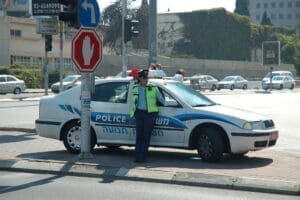Speeding and Important Information About the Laser Speedometer
Were you caught speeding? Are you afraid you may get caught? When passing by a police car at the side of the road, do you start sweating without knowing why? This article is for you! Below, the best lawyers from our firm explain about what a laser speedometer is, how it works, how to defend yourself against tickets based on speedometer readings, what the mechanism’s operating requirements are, in what situations is it not acceptable as evidence in court (due to weather conditions, lighting, and more), and, most importantly – what the consequences of all this are for you if you do not admit your offense before the police officer.
This article about the laser speedometer, written by the best lawyers from our firm, answers all the above-mentioned questions and explains what to do if you are ticketed based on the reading of a laser speedometer. The article will guide you through the whole procedure, including important points to take note of during such an incident. You will learn about your right to consult with a lawyer before and during the hearing, what offenses will automatically result in a court hearing as opposed to a choice of fine, and how you can ensure that the judge will see all the evidence relevant to your case.

What Is a Laser Speedometer?
A laser speedometer is the most common mechanism of speed enforcement used by the police. It has been used since the 1980s (in accordance with the technological advancements of the time, of course). It looks like a laser gun and has a handle and a sight. When operated, it directs a focused laser beam toward a point in the distance and measures the time it takes for the beam to return.
After this time is measured, the device autonomously calculates the distance at which the measurement was performed as well as the length of time it took for the beam to return, thus weighting the speed of the measured target – and displays it on the device monitor.
Operating the device is simple – all the police officer needs to do is aim the eyepiece at the speeding vehicle and press the trigger. Less than half a second later, the speed of the vehicle appears on the device.
The Supreme Court ruled that laser speedometers are highly reliable, as long as that they are used according to the manufacturer’s instructions and requirements. For example: (1) The measuring distance shall not exceed 300 meters, unless a tripod is used by the police officer operating the device; (2) the device must be daily and periodically calibrated, in accordance with the manufacturer’s instructions; (3) there must be eye contact between the target vehicle and the police officer; (4) the line of sight between the target vehicle and the police officer must be clear of obstructions; (5) additional instructions regarding the use of laser speedometers at night are expanded upon below.
What Happens After the Laser Speedometer Detects a Speeding Vehicle?
One of two things: either the vehicle significantly exceeded the allowed speed, in which case the driver will be summoned to court; or else the vehicle only slightly exceeded the allowed speed, in which case the driver will receive a payable speeding ticket, with 90 days to decide whether to be judged for the offense or simply pay the fine and get it over with. If the driver chooses to be judged – they must fill out the form attached to the traffic ticket (“Request to Be Judged”) and send it to the address indicated on its back.
Administrative License Suspension by a Police Officer
If you find yourself in the unfortunate situation of significantly exceeding the allowed speed and being summoned to court without having the option of paying a fine – you will be summoned to a hearing before a police officer who will decide whether or not to suspend your driver’s license for 30 days. In this case, the driver may challenge the administrative license suspension by requesting a hearing, which will then take place at the court of traffic offenses within a few days from the time of the request. At this stage it is important to consult with a lawyer, and doing so may greatly help the driver.
How Can a Traffic Lawyer Help a Driver Who Was Ticketed Based On the Reading of a Laser Speedometer?
First of all – a traffic lawyer can photocopy the evidence from the police prosecution and review the memoranda prepared by the police officer who performed the inspection and/or other police officers who were present at the time of the incident.
Secondly – the lawyer can check whether the device was calibrated as required, both on a daily and periodic basis.
Thirdly, and most importantly – when reviewing the material, the lawyer will be able to search for mistakes in the evidence, which may lead to the acquittal of the accused, or at least enable the lawyer to request mitigation of the penalty. In these cases, the lawyer may reach a mitigating plea bargain in the form of amending the indictment, reducing the points added to the driver’s license, or even canceling the traffic ticket.
The laser speedometer’s reliability has been discussed from time to time at court, and the Supreme Court recently set a reliability standard for the device to determine its level of accuracy: 3 km/h when the vehicle speed is lower than 100 km/h, and 3% of the measured speed when the vehicle speed is higher than 100 km/h. This standard is intended to be used by the police when determining the range of speed enforcement, and has led the police to reduce 5 km/h from the reading shown on the device.
Another important limitation of the device is that, according to the manufacturer’s instructions, it cannot be relied upon in severe weather conditions. This means that, in rainy or snowy weather, the laser speedometer should not be used and is not reliable. If the police pull you over in such weather and show you a high speed reading on a laser speedometer – take out your cell phone and capture the weather conditions so that you have evidence to present against the police prosecution in court, and the penalty that you receive may be mitigated accordingly.
There are additional requirements when using a laser speedometer at night, and knowing what they are will benefit you if you get in trouble with the police: (1) the section of the road where the vehicle speed is measured must be sufficiently lit – that is, the laser speedometer must not be used in a place that lacks full night lighting; (2) the measurement must not be conducted from a distance that is greater than 300 meters.
Conclusion
Speeding may risk your safety and life. But if you do speed and get caught by the police, we recommend that you consult an expert traffic lawyer before your trial.
The lawyer will also be able to represent you at the hearing and help prevent you from receiving an administrative license suspension, which is almost automatically given in the case of speeding. For speeding on the road, the court usually gives a thirty-day administrative license suspension, and the only way to avoid this is probably by consulting a lawyer who can represent you at the hearing itself.
Remember that documenting the conditions during the incident is recommended and may be of help. By taking out your mobile device and photographing the scene (preferably without the police noticing – because, although it is legal, the police may not like it), the driver may receive a mitigating penalty for the offense.
Also remember that, by consulting a lawyer on time (as soon as possible), the lawyer will be able to examine additional factors that may affect your penalty, such as compliance with field conditions, calibration of the device, the distance at which the measurement was performed, the lighting, etc.
The above should not be construed as legal advice and/or a substitute for legal advice, and/or a legal opinion. A certified lawyer should be consulted for each case according to its circumstances.
Our law firm specializes in traffic law, and we have extensive experience in the field. We are fully at your service for any legal question that you may have.
מאמרים מומלצים

